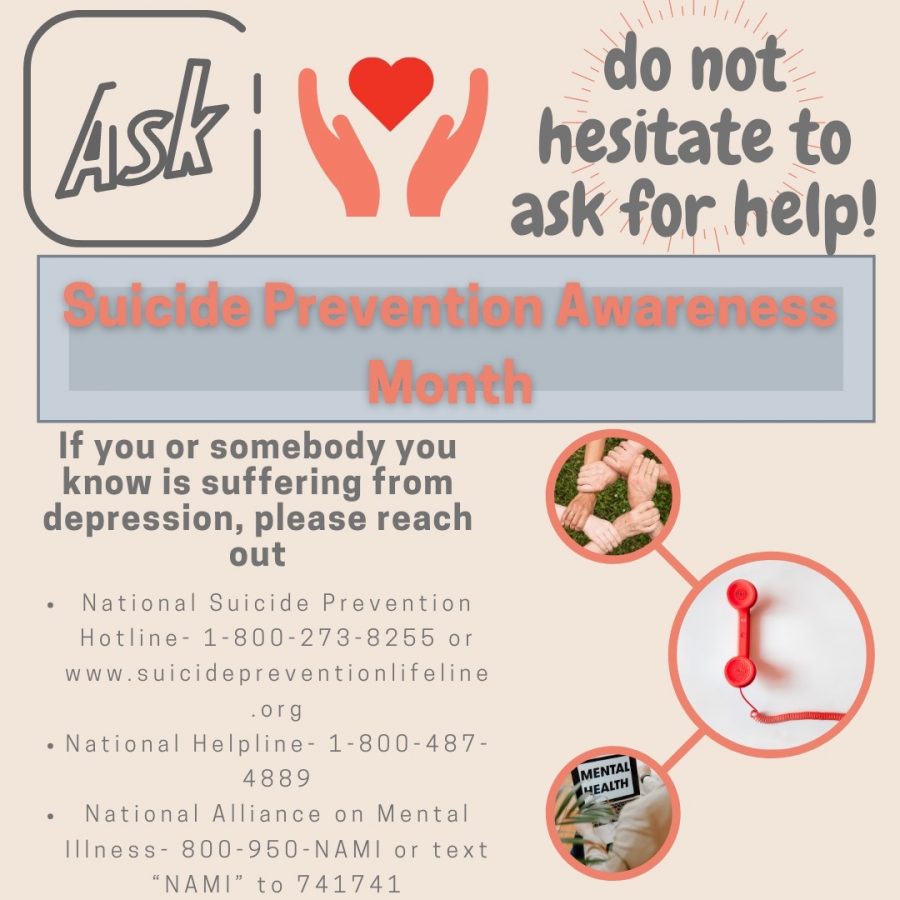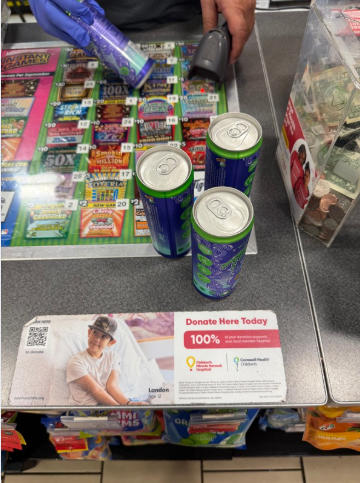Suicide Awareness and Prevention
September 15, 2020
According to the Center of Disease Control over 48,000 lives are lost annually due to suicide in the United States alone.
It is no question that suicide is a pressing issue, and a major public health concern. This isn’t just referring to physical health however, but also mental health.
Between 20 and 30 percent of adolescents have reported symptoms of depression, which is the prolonged feeling of hopelessness that leads to suicide. Almost 9 percent of high school students have attempted suicide in the last year, and suicide is the 2nd leading cause of death for 10 to 24 year olds.
In order to minimize these percentages, it is important to educate the youth on how to properly deal with hard situations surrounding mental illness. The month of September is dedicated to Suicide Awareness, to educate, spread awareness, and advocate for those who feel like they have nothing to live for.
Teen depression is more than just feeling gloomy. It is a chemical imbalance that affects everything about how someone goes throughout their day. It is influenced by a lot of factors that are often out of control, such as genetics, childhood trauma, loss of a loved one, family situation, and many more. In order to recognize depression in yourself or a loved one, it is important to know the symptoms.
Keep in mind, depression affects everyone differently, so it won’t always look the same on one person compared to another. Some common symptoms are: constant irritability, sadness or anger, lack of self worth, too much or not enough sleep, self harm, constant desire to cry, turning to drugs or alcohol to temporarily feel better and/or feeling hopeless.
“Patients with depression often lose interest in things that used to make them happy. You might find that someone with depression is not doing much with his or her day and not engaging in activities that used to be important,” Dr. Cindy L. Carmack said. If you notice symptoms similar to these in yourself or someone you may know, reach out.
Depression is never easy, but it is a lot harder without help. Reaching out to a trusted family member, friend, coach, or teacher is the first step towards feeling happy, fulfilled, and healed. Seeking help offers a support system and treatment which significantly lightens the emotional load those with depression have to experience.
It may be hard for depression victims to believe that it gets better, since hopelessness is a common symptom of depression, but in actuality, 80 to 90 percent of those who seek treatment are treated successfully with therapy and/or medications. Dr. Carmack urges depression victims to seek help due to the fact that “a lot of pain can be avoided if patients and their families inform the doctor of any signs of depression or anxiety,” she said.
If somebody genuinely feels that there is nobody in their life that they can talk to about their depression, there are many hotlines available that let people remain anonymous while providing support, such as the National Suicide Prevention Hotline which can be reached at 1-800-273-8255. By starting the conversation, supplying support, and getting help to those in need, suicide can be prevented and countless lives could be saved.
Mental health and physical health go hand in hand, and have a direct relationship to one another. Depression tends to lead to lack of interest in nutrition, exercise, and self care. However, these three things are essential to maintaining good physical health. As mental health continues to get worse, it is more common than not that physical health will worsen as well. Thankfully, this works in the other direction too. Thus, as hard as it may be, focusing on maintaining good physical health when depressed can often help improve the symptoms.
For those who know somebody who is dealing with depression, it may be hard to know how to help at first. One thing that can help is simply letting them know that they are cared for. Perhaps asking them about their day, validating their feelings, and/or sparking up a conversation to lift their spirits. It may seem small, but those who are depressed often feel like nobody cares about them, so letting them know you are there goes a long way. Another thing to do is tell a trusted adult about their condition if it would help them in the long run, even if they don’t think it is necessary. It’s better to be safe than sorry when somebody’s life may be at stake.
Although the month of September is dedicated to suicide prevention, it is important to carry these messages year round. If you or somebody you know is suffering from depression, do not lose hope. It gets better and the future is full of happy moments that you don’t want to miss out on. Do not be afraid to reach out to a trusted parent, teacher, or friend. You are loved, your life is precious, and you’re stronger than any mental health challenge.
If you are suffering from depression, please reach out
National Suicide Prevention Hotline- 1-800-273-8255 or www.suicidepreventionlifeline.org
National Helpline- 1-800-487-4889
Find A Therapist Directory- https://members.adaa.org/page/FATMain
National Alliance on Mental Illness- 800-950-NAMI or text “NAMI” to 741741 https://www.nami.org/Home







